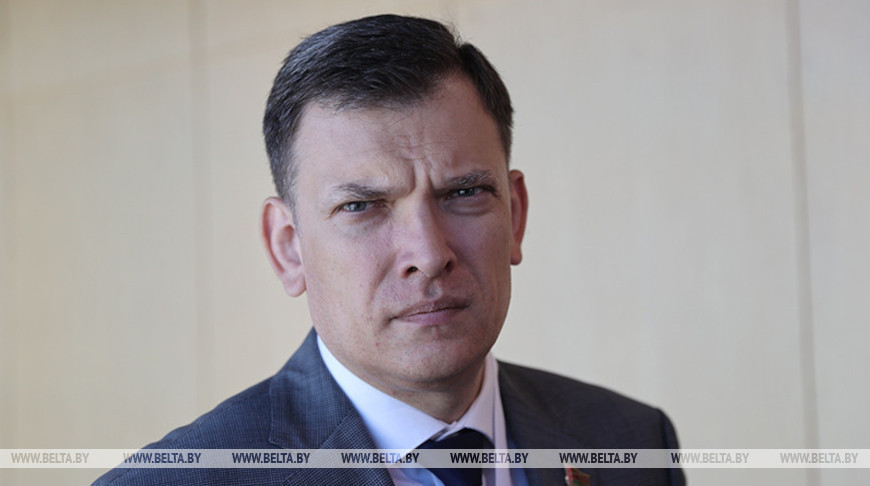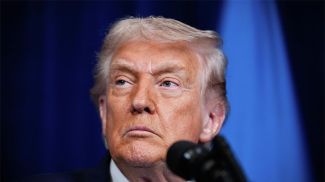
MINSK, 21 November (BelTA) – There is no place for ‘fairness’ when we talk about sanctions adopted in violation of international law, Belarusian Deputy Minister of Foreign Affairs Yuri Ambrazevich said as he addressed the international conference "Sanctions, Business, Human Rights" organized by UN special rapporteur on the negative impact of unilateral coercive measures of human rights Elena Dovgan, BelTA has learned with reference to the press service of the Ministry of Foreign Affairs.
First of all, Yuri Ambrazevich thanked Elena Dovgan for her efforts to fight unilateral coercive measures in strict accordance with the UN Human Rights Council resolution. "We consider it an extremely important initiative aimed at uniting international efforts in order to minimize the impact of sanctions on human rights," he said.
Speaking on behalf of the Belarusian government, Yuri Ambrazevich stressed that the main goal of the country is to completely stop the practice of illegal unilateral restrictive measures and abolish those already introduced in violation of international law, without the consent of the UN Security Council. "It is gratifying to know that this approach is supported by the overwhelming majority of UN member states, and the member states of the Group of Friends in defense of the UN Charter have enough political will to voice their position publicly," he said.
Belarus plans to continue to work tirelessly together with like-minded states to reflect this position in UN documents, the deputy minister noted. "The number of such documents adopted at various global and regional international forums is constantly growing. We are in our right. No one should doubt this: either presidents or students," he said. All participants of the conference heard the voice of the academic community, which, according to the deputy minister, united around the same thesis.
Recently, the topic of countering unilateral coercive measures in international relations has been trending high in the hierarchy of priorities of scientific research and educational discussions in Belarus. This applies to both scientific teams and educational institutions of the humanities, primarily political science, law and economics.
"We are confident that the formation of an international academic and educational dimension in international efforts to counter unilateral sanctions meets the interests of all states affected by sanctions. The relevant doctrine should convincingly prove that there is no place for "fair" sanctions adopted in violation of international law," Yuri Ambrazevich noted.
He emphasized the impact of sanctions on the economy and business. Belarus regularly shares its input on this issue with the UN Secretariat as part of the implementation of the UN General Assembly resolution “Human Rights and Unilateral Coercive Measures”. “It is a widely known fact already that sanctions braking the development of each of the affected countries have already made it impossible for the entire world community to achieve the Sustainable Development Goals. We urge all those who will suffer because of this not to hide their heads in the sand, but to join the member states of the Group of Friends in Defense of the UN Charter and openly speak out from these positions,” the deputy minister of foreign affairs said.
According to him, in the current circumstances Belarus calls on like-minded states, already suffering from sanctions, as well as all the states, all sympathizers to unite in the search for ways to create systems to facilitate international financial settlements. “The world should free itself from the monopoly of one currency and find an alternative,” he emphasized.
Yuri Ambrazevich also drew the attention of the business community, especially banks from all states, and not only Western ones, to the fact that the outcome of the conference will give them a legal and political tool.
“These are guidelines for working with your governments in terms of overcoming the vulnerability and uncertainty of your positions, that fear of being penalized by your regulators because of trade relations with sanctioned states. This tool will help you fully fulfill your social goals, the missions of your companies without prejudice to you and without discriminating against the citizens of such countries, including making full use of humanitarian exemptions,” he said.
“Perhaps this will not solve the problem globally, will not ban sanctions or cancel all sanctions, but it should help you return your goods and services to those people who are really suffering because of the lack of necessary medicines or other important products, whose human rights have been violated by the voluntaristic unilateral coercive measures of certain countries,” he added.
The deputy minister of foreign affairs also briefly addressed the authors of unilateral coercive measures, the respective governments: “The harmfulness of your illegal actions for the interests of ordinary people, including in your own countries, has already been proven repeatedly and in a variety of ways. The senselessness and uselessness of pressure on independent states is obvious to everyone. We urge you to return to the logic of equal dialogue and mutually beneficial cooperation in full compliance with international law.”













